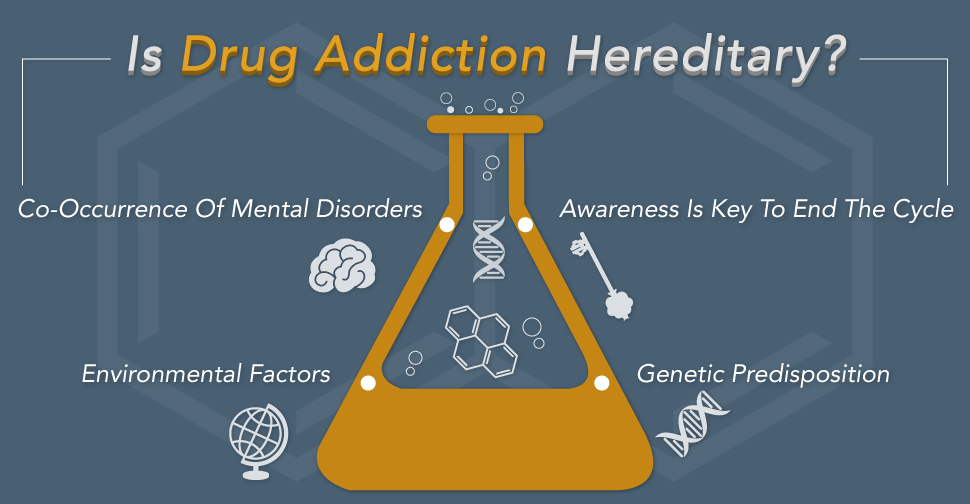
In a recent poll, nearly 80 percent of people surveyed described individuals suffering from addiction as weak or lacking will power. We now know weakness and will power have little to do with the process of addiction. People who suffer from addiction face a chronic disease and often demonstrate enormous strength along their road to recovery.
Genetic predisposition, not will power, places someone at a higher risk of vulnerability to addiction. Studies, along with brain imaging scans, have repeatedly demonstrated genetics play a greater role in addiction than any external factors. External factors, however, certainly complicate things for someone already predisposed to addictive behaviors.
Genetic Predisposition To Drug Addiction
Scientists first began considering genetic predisposition to addiction when Harvard initiated a study examining incidents of substance abuse among identical and fraternal twins. Approximately 8,000 individuals were studied, representing 1,874 sets of identical twins and 1,498 sets of fraternal twins. The study concluded that 10 percent of the entire study population experienced an addiction to at least one illicit substance, a rate only slightly higher than the national average, with nearly double the incidence of drug addiction shared among twin pairs in the identical twin group.
Since identical twins come from a single fertilized egg (versus two fertilized eggs as is the case with fraternal twins), they are genetically identical. The higher incidence of drug addiction among these pairs of twins suggests a strong genetic component to addiction.
More recently, scientists have begun to compare DNA of family members who abuse drugs or alcohol with those family members who do not, with the hope of isolating which genetic variations lead to an increase in addictive behaviors. They’ve since isolated several key genes that play a role in specific types of addiction. For example, someone with no serotonin receptor gene Htr1b is at greater risk of addiction to alcohol or cocaine. And those who refrain from smoking because they claim it makes them feel sick or dizzy, are more likely to carry an alternate form of the YP2A6 gene, which generates those ill-side effects.
Where multiple “addiction genes” appear in an individual, the likelihood toward drug dependency is higher. These genetic traits are passed down with some variation, making heredity, as with other chronic illnesses, a key factor in drug addiction among families.
Why Genetic Predisposition To Addiction?
Brain chemistry-more specifically the reward centers of the brain-plays a pivotal role in the development of substance dependency. In terms of evolution of the species, genetic factors toward sensitivity of these parts of the brain were once key to human survival. Early humans searched for food and sought shelter based on this hard-wired reward process.
Where these genes once played a key role in our survival, making us crave foods high in fat or carbohydrates and proteins, they now defy us. These reward centers were developed based on scarcity, but in a world where we are flooded with an abundance of everything from food to our drug of choice, addiction has emerged as a chronic illness. Illicit substances, along with alcohol, hyper-stimulate the reward centers of the brain in ways poor, unsuspecting evolution never anticipated.
Co-occurrence Of Mental Disorders And Drug Abuse
Complicating heredity and addiction is the incidence of mental disorders which often result in addiction that runs in families. While it is difficult to ascertain which came first, there is a definitive link between the incidence of mental illness corresponding with an increase in the incidence of substance abuse. Mental illness, like addiction, runs in families, offering a co-occurring factor in heredity and addictive behaviors.
External Or Environmental Factors And Drug Addiction
Environmental or external factors contributing to drug addiction aren’t necessarily hereditary, but are certainly passed down generation to generation. Studies examining these external influences and addiction risk, indicate an eight-fold increase in substance abuse by adults who grew up in households in which at least one parent exhibited addictive behaviors.
Psychological dependency on a substance often stems from a person’s inability to cope with events in their everyday lives. Children in households where addiction and mental illness are present, at ages when emotional attachments and coping strategies are still developing, are at a higher risk of drug dependency later on in life, choosing instead to self-medicate.
Awareness Is Key To Ending Cycle Of Drug Abuse In Families
In the United States, drug addiction affects one in four families. Within these families, genetics play a pivotal role in whether someone is likely to develop an addiction to drugs or alcohol. That said, it does not need to be a determinate. One way to circumvent addiction in a family is to maintain an awareness of addictive tendencies.
If you know addiction runs in your family, remain vigilant and empower yourself with knowledge on the kinds of external factors or situations that can trigger use of substances like drugs or alcohol. This requires ongoing efforts and education for families who struggle with addiction. These external factors include stress, exposure to physical or sexual abuse, social pressures, and access to alcohol and other drugs, among others. If you are aware that you may have a predisposition toward addiction, refraining from use of alcohol or drugs is essential, especially when these external factors are present.
Getting Help For Drug Addiction
If you or someone in your family is suffering from an addiction to drugs or alcohol, DrugRehab.org can connect you with the resources you need to get informed and to locate treatment options that work best for your individual needs. Contact DrugRehab.org and speak with someone in confidence today and discover the tools you need to end the cycle of drug abuse in your family.

